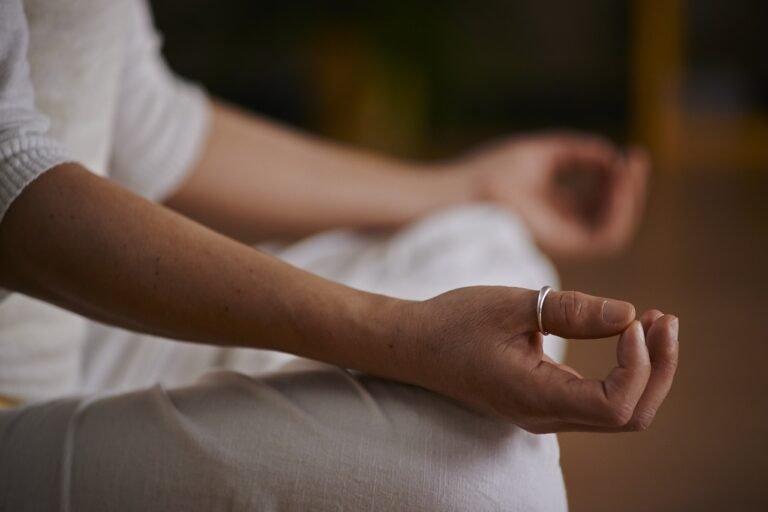9 Life-Changing Yoga Poses for Mental Health (Backed by Science & Ancient Wisdom)
Table of Contents
ToggleWhy I Turned to Yoga for Mental Health
Feeling anxious, numb, or emotionally stuck? These 9 yoga for mental health poses calm the nervous system, reduce stress, and help you heal — naturally.I didn’t start yoga to touch my toes.
I started it because I couldn’t sleep, couldn’t breathe, couldn’t feel grounded in my own body. Therapy helped my mind, but my body still felt frozen — locked in trauma and tension. That’s when I turned to yoga for mental health.
This wasn’t about flexibility. It was about freedom. I needed a way to regulate my nervous system, move emotions I couldn’t name, and find safety inside myself again.
And it worked.
Over the last year, these 9 simple yoga for mental health poses helped me reclaim clarity, trust, and stillness. Whether you’re dealing with anxiety, burnout, or CPTSD — this practice can support you too.
Why Yoga for Mental Health Works (Science + Ayurveda)
Modern science and ancient Ayurveda both agree: yoga for mental health works because it supports the nervous system from the root.
Shifts the body from “fight or flight” to “rest and repair”
Regulates cortisol and adrenaline
Activates the vagus nerve (linked to emotional regulation)
Releases trauma stored in fascia, muscles, and breath
Calms overactive thoughts and reconnects body + mind
In Ayurveda, anxiety and mental unrest are often linked to Vata imbalance (air + space). Grounding yoga for mental health practices help balance this — restoring stillness, warmth, and safety within.
Before discovering yoga for mental health, I lived in a constant state of panic and dissociation. The first time I tried yoga for mental health, I cried — not out of pain, but relief. These poses helped me soften into safety.
With consistent practice, yoga for mental health helped me reduce panic attacks, improve sleep, and feel emotionally clearer. Unlike workouts that push your body, yoga for mental health meets you with kindness.
I recommend starting yoga for mental health with just 10 minutes a day — especially if you’re healing from burnout or trauma. The most powerful part of yoga for mental health is the breath: it rewires your stress response.
Whether it’s child’s pose, legs up the wall, or pranayama — yoga for mental health helped me feel alive again. Every day I return to yoga for mental health as a way to come home to my body. It doesn’t matter how flexible you are — what matters is that you show up.
9 Healing Yoga Poses for Mental Health (Beginner-Friendly)
You don’t need to be flexible or own a fancy mat. These yoga for mental health poses can be done on your bed, in your living room, or anywhere you feel safe.
1. Balasana (Child’s Pose)
The pose of surrender and emotional safety.
How to Do It:
Kneel → fold forward → arms stretched or beside body → forehead on floor or pillow.
Why It Helps:
Reduces overstimulation
Eases fatigue and emotional shutdown
Calms Vata (anxiety)
2. Cat-Cow (Marjaryasana-Bitilasana)
Synchronizes breath with movement.
How to Do It:
On all fours → inhale to arch → exhale to round.
Why It Helps:
Releases spinal tension
Improves breath rhythm
Boosts energy + mood
3. Viparita Karani (Legs Up the Wall)
Instant calm for a racing mind.
How to Do It:
Lie on back → legs up against wall → pillow under hips (optional)
Why It Helps:
Lowers cortisol
Soothes panic attacks
Enhances blood flow to brain
4. Sukhasana + Pranayama (Easy Pose with Breathwork)
Simple breath-focused grounding.
How to Do It:
Sit cross-legged → inhale for 4, exhale for 6–8 → repeat.
Why It Helps:
Activates parasympathetic response
Helps you self-regulate emotions
Clears brain fog
5. Bhujangasana (Cobra Pose)
Heart opener for emotional strength.
How to Do It:
Lie on belly → palms under shoulders → lift chest gently
Why It Helps:
Improves posture (linked to mood)
Opens chest (stored grief)
Boosts confidence
6. Paschimottanasana (Seated Forward Fold)
Releases control and overthinking.
How to Do It:
Sit with legs out → fold forward from hips → hands on shins or toes
Why It Helps:
Eases anxiety + hyperactivity
Calms mind and digestion
Stimulates vagus nerve
7. Tadasana (Mountain Pose)
The ultimate grounding posture.
How to Do It:
Stand tall → feet rooted → arms relaxed → gaze soft
Why It Helps:
Reconnects body and breath
Increases confidence
Good for dissociation + freeze states
8. Nadi Shodhana (Alternate Nostril Breathing)
Balancing breath for emotional clarity.
How to Do It:
Inhale through left → switch → exhale through right → repeat
Why It Helps:
Balances brain hemispheres
Reduces overwhelm
Prepares you for sleep or journaling
9. Savasana (Corpse Pose)
The final release.
How to Do It:
Lie down → arms + legs relaxed → eyes closed → breathe naturally
Why It Helps:
Integrates entire practice
Deeply restorative
Releases tension stored in jaw, belly, and hips
Ideal Yoga for Mental Health Routine (By Time of Day)
| Time of Day | Recommended Poses | Why |
|---|---|---|
| Morning | Cat-Cow, Cobra | Energize, build motivation |
| Afternoon | Tadasana + Pranayama | Regroup and ground mid-day |
| Evening | Viparita Karani, Forward Fold | Calm nervous system before bed |
| Bedtime | Savasana + Nadi Shodhana | Release stress, improve sleep |
Emotional Clarity & Self-Trust
The more I practiced yoga for mental health, the more I noticed something beautiful: emotional clarity. I could feel again. Cry without guilt. Rest without shame.
My hips released grief. My chest opened with breath. And my nervous system, once frozen, began to thaw.
Yoga for mental health isn’t just about the mat. It’s a return to safety in your own body. It teaches you that even when your mind is spiraling, your breath can anchor you back to truth.
Whether you’re healing from burnout, heartbreak, or trauma — yoga for mental health offers quiet strength.
And over time, you realize: this is not a workout. This is a homecoming.
Watch Our Video: Yoga Nidra for Deep Rest
Experience the calming and rejuvenating benefits of Yoga Nidra for deep rest and relaxation. Watch the video and immerse yourself in tranquility.
Pair Yoga for Mental Health With:
Herbal teas like chamomile, tulsi, or fennel
Journaling (track mood before/after)
Soft instrumental music or mantras
Lavender or vetiver essential oil diffuser
Weighted blanket or cozy socks post-session
Common Myths That Block People From Starting Yoga
Myth 1: “I’m not flexible enough.”
✅ Yoga makes you flexible. You don’t need to be bendy to begin.
Myth 2: “Yoga is too slow to help with mental health.”
✅ The slowness is what resets the brain and nervous system.
Myth 3: “It’s religious or spiritual — I’m not into that.”
✅ Yoga is a practice, not a belief system. You can make it as grounded or spiritual as you want.
Tech Note:
This blog was created on WhiteBalanceAI.com, the platform I use to build healing, high-traffic blogs that serve and scale.
👉 Start your own healing blog →
FAQs: Yoga for Mental Health
Q1. How can yoga improve mental health?
Yoga helps improve mental health by reducing stress, anxiety, and depression. It promotes relaxation, mindfulness, and emotional balance through physical postures, breathing techniques, and meditation.
Q2. What types of yoga are best for mental health?
Gentle forms of yoga, such as Hatha, Vinyasa, and Restorative yoga, are particularly beneficial for mental health. These styles emphasize relaxation, breathing, and mindfulness, which can help reduce stress and promote emotional well-being.
Q3. How does yoga help reduce anxiety?
Yoga reduces anxiety by stimulating the parasympathetic nervous system, which helps the body relax and calm the mind. Breathing exercises like Pranayama also help regulate the breath, which can lower heart rate and reduce feelings of anxiety.
Q4. Can yoga help with depression?
Yes, yoga can help alleviate symptoms of depression by promoting the release of endorphins, improving mood, and reducing negative thoughts. Certain poses and mindfulness practices encourage positive thinking and emotional resilience.
Q5. How often should I practice yoga for mental health benefits?
Practicing yoga for mental health benefits can be effective even with just 20-30 minutes a few times a week. Consistency is key, and even a short daily practice can lead to improved mental clarity, emotional balance, and stress reduction.







